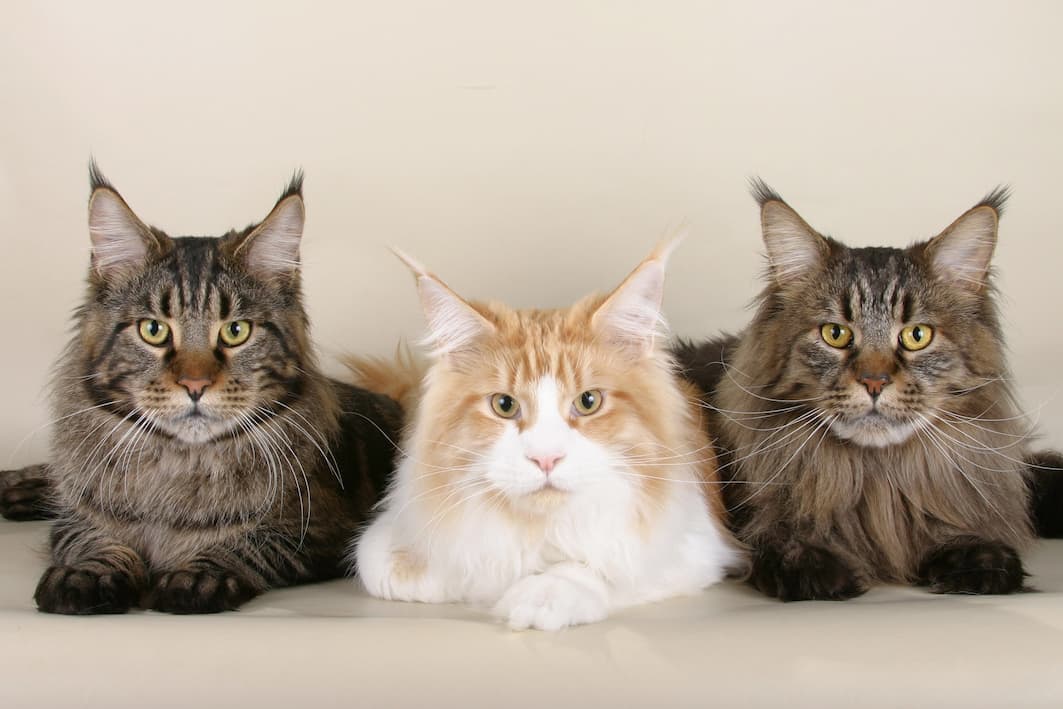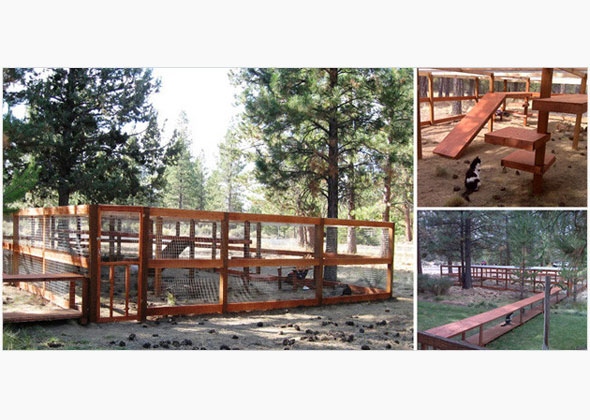Maine Coon
Published on July 04, 2011

Breed Characteristics
Adaptability
Energy Level
Child Friendly
Social Needs
Shedding Level
Grooming
Health Issues
Stranger Friendly
Affectionate
Dog Friendly
Intelligence
The official state cat of Maine is — you guessed it — the Maine Coon. This plus-size cat, adorned with a beautiful neck ruff, dainty britches, tufted feet that resemble snowshoes and a big, bushy tail that he can wrap around himself when he naps is likely the oldest cat breed native to America. The Maine Coon is a big lug. He has a muscular, big-boned body and weighs 9 to 18 pounds. You may have heard tell of 30-pound behemoths, but any Maine Coon that reaches that size is probably grossly overweight.
The Maine Coon is sweet and friendly, with the typically curious cat nature. He loves his family but isn’t demanding of attention. He’ll follow you around and show an interest in what you’re doing, and if you’d like to give him some lap time, well, he’s all in favor of that, too. This is one of those cats who gets along with everyone, including dogs and other cats. He enjoys playing fetch and is willing to learn to walk on a leash, making him a great choice for anyone who travels frequently and would like to bring a feline companion along.
Maine Coons communicate with a chirping trill rather than a meow, an incongruous sound coming from a gentle giant. They are well suited to any home with people who will love them and give their gorgeous coat a weekly combing. Keep them indoors to protect them from cars, diseases spread by other cats and attacks from other animals.
Other Quick Facts
- Maine Coons are friendly and get along with everyone, including children, dogs and other cats.
- The Maine Coon has a long, beautiful coat, but it usually doesn’t mat and requires only weekly combing.
- The Maine Coon coat comes in an amazing variety of colors and patterns, including a wide range of solids, tortoise shells, tabbies, tabby with white, and parti-color (two colors).
The History of Maine Coons
Lots of myths surround the origin of the Maine Coon, from the belief that he’s the result of a cross between a cat and a raccoon — biologically impossible — to the fanciful notion that he descends from French cats sent to Maine by Marie Antoinette in anticipation of her intended escape from France. More likely, the cats descend from meet-ups between shorthaired domestic cats already in this country and dashing longhaired foreign cats brought home as souvenirs by New England sailors. Some even say the Vikings might have brought longhaired cats with them when they touched the shores of America a thousand years ago, and indeed there is a resemblance between the Maine Coon and the Norwegian Forest Cat. Wherever they came from, the cats were viewed as household and farm workers, highly valued for their mousing talent.
The first mention of a cat called a Maine Coon occurred in 1861, in reference to a black and white specimen named Captain Jenks of the Horse Marines. It wasn’t unusual to see Maine Coons at the then-new and popular events called cat shows held in Boston and New York. In 1895, a brown tabby Maine Coon named Cosie won Best Cat at the Madison Square Garden Show.
Today, Maine Coons are among the most popular pedigreed cats. They rank third among the breeds registered by the Cat Fanciers Association.
Maine Coon Temperament and Personality
The Maine Coon is sweet and friendly, with the typically curious cat nature. He is a sociable cat who loves his family but isn’t demanding of attention. He’ll follow you around and show an interest in what you’re doing, and if you’d like to give him some lap time, he’s happy to oblige.
This is one of those cats who gets along with everyone, including dogs and other cats. He enjoys playing fetch and is willing to learn to walk on a leash, making him a great choice for anyone who travels frequently and would like to bring a feline companion along. When you’re not home with him, keep your Maine Coon entertained with puzzle toys, a bird feeder he can watch from the window and a water bowl he can splash in.
Maine Coons communicate with a variety of sounds. In addition to the all-purpose meows and purrs, you will hear them cheep, chirp and trill, incongruous sounds coming from a gentle giant. They use body language, too. A Maine Coon will give you a nice head butt to let you know just how special you are to him.
Maine Coons can adapt to any type of home in any climate. They are built for cold outdoor living, but it’s safer to keep them inside so they don’t get hit by cars or run the risk of disease spread by other cats.
What You Need to Know About Maine Coon Health
All cats have the potential to develop genetic health problems, just as all people have the potential to inherit diseases. Any breeder who claims that her breed has no health or genetic problems is either lying or is not knowledgeable about the breed. Run, don’t walk, from any breeder who does not offer a health guarantee on kittens, who tells you that the breed is 100 percent healthy and has no known problems, or who tells you that her kittens are isolated from the main part of the household for health reasons.
Maine Coons have some hereditary health issues that can be of concern, especially if you aren’t cautious about who you buy from. They include hypertrophic cardiomyopathy, hip dysplasia and spinal muscular atrophy.
Hypertrophic cardiomyopathy (HCM) is the most common form of heart disease in cats. It causes thickening (hypertrophy) of the heart muscle. An echocardiogram can confirm whether a cat has HCM. Avoid breeders who claim to have HCM-free lines. No one can guarantee that their cats will never develop HCM. Maine Coons that will be bred should be screened for HCM, and cats identified with HCM should be removed from breeding programs. Researchers have identified the genetic mutation that causes the development of HCM in the Maine Coon and have developed a genetic test that allows breeders to screen cats before breeding them. Do not buy a kitten whose parents have not been tested for this disease.
Hip dysplasia is a hereditary defect of the hip socket. It can be mild, causing little or no pain, or it can eventually lead to severe lameness. Maine Coons with hip dysplasia may move slowly or avoid jumping. Depending on the severity of the condition, weight loss, medication or surgery can help to relieve pain. Maine Coons who will be bred should have their hips x-rayed and graded by a veterinary orthopedic specialist at two years of age. Ask the breeder to show evidence that a Maine Coon kitten’s parents have hips that have been rated as fair, good or excellent.
Spinal muscular atrophy is caused by the death of spinal cord neurons that activate skeletal muscles of the trunk and limbs, leading to muscle weakness and degeneration. Kittens with SMA walk with swaying rear ends and have difficulty jumping. The disease doesn’t cause pain and the cats can live an otherwise normal life. A DNA test to identify carriers or to diagnose possibly affected kittens is now available.
The Basics of Maine Coon Grooming
The Maine Coon has a heavy, shaggy coat that’s silky to the touch. It rarely mats and weekly combing is all that’s needed to care for it. Combing removes the dead hairs that would otherwise be ingested by your cat when he bathes himself, resulting in hairballs. Trim the nails as needed, usually every 10 days to two weeks. Cats can be prone to periodontal disease, so brush the teeth at home with a vet-approved pet toothpaste and schedule regular veterinary dental cleanings.
Choosing a Maine Coon Breeder
You want your Maine Coon to be happy and healthy so you can enjoy your time with him, so do your homework before you bring him home. For more information on the history, personality and looks of the Maine Coon, as well as breeder recommendations, visit the websites of the Maine Coon Breeders and Fanciers Association, Maine Coon Cat Breed Council, The International Cat Association, American Cat Fanciers Association and the Fanciers Breeder Referral List. A reputable breeder will abide by a code of ethics, such as the one developed by the MCBFA, which prohibits sales to pet stores and wholesalers.
A reputable breeder will abide by a code of ethics that prohibits sales to pet stores and wholesalers and outlines the breeder’s responsibilities to their cats and to buyers. Choose a breeder who has performed the health certifications necessary to screen out genetic health problems to the extent that is possible, as well as one who raises kittens in the home. Kittens who are isolated can become fearful and skittish and may be difficult to socialize later in life.
Lots of reputable breeders have websites, so how can you tell who’s good and who’s not? Red flags include kittens always being available, multiple litters on the premises, having your choice of any kitten, and the ability to pay online with a credit card. Those things are convenient, but they are almost never associated with reputable breeders.
Whether you’re planning to get your feline friend from a breeder, a pet store, or another source, don’t forget that old adage “let the buyer beware”. Disreputable breeders and unhealthy catteries can be hard to distinguish from reliable operations. There’s no 100% guaranteed way to make sure you’ll never purchase a sick kitten, but researching the breed (so you know what to expect), checking out the facility (to identify unhealthy conditions or sick animals), and asking the right questions can reduce the chances of heading into a disastrous situation. And don’t forget to ask your veterinarian, who can often refer you to a reputable breeder, breed rescue organization, or other reliable source for healthy kittens.
Be patient. Depending on what you are looking for, you may have to wait six months or more for the right kitten to be available. Many breeders won’t release kittens to new homes until they are between 12 and 16 weeks of age.
Before you buy a kitten, consider whether an adult Maine Coon might be a better choice for your lifestyle. Kittens are loads of fun, but they’re also a lot of work and can be destructive until they reach a somewhat more sedate adulthood. And with an adult, you know more about what you’re getting in terms of personality and health. If you are interested in acquiring an adult cat instead of a kitten, ask breeders about purchasing a retired show or breeding cat or if they know of an adult cat who needs a new home.
Adopting a Cat from Maine Coon Rescue or a Shelter
A breeder is not your only option for acquiring a Maine Coon. Although Maine Coon kittens are almost never found in shelters and rescue, adult Maine Coons, both pedigreed and mixed, are not so fortunate. You may find the perfect Maine Coon for your family through Maine Coon Cat Breed Rescues or by checking your local shelters or the listings on Petfinder or Adopt-a-Pet.com .
Make sure you have a good contract with the seller, shelter or rescue group that spells out responsibilities on both sides. In states with “pet lemon laws,” be sure you and the person you get the cat from both understand your rights and recourses.
Kitten or adult, take your Maine Coon to your veterinarian soon after adoption. Your veterinarian will be able to spot problems, and will work with you to set up a preventive regimen that will help you avoid many health issues.



